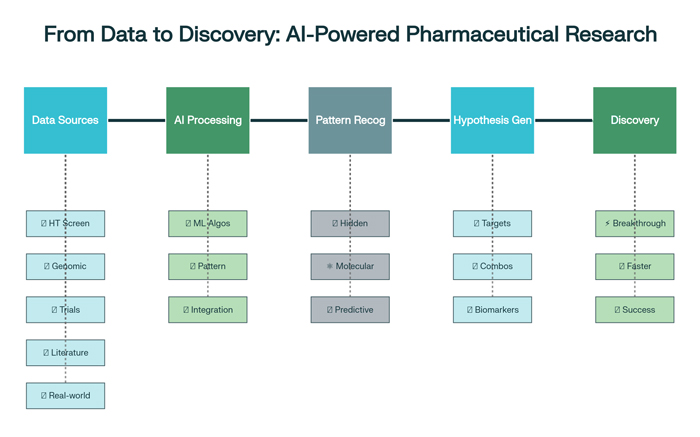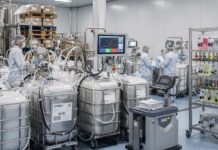From Data to Discovery: The Role of Generative AI in Modern Pharma Laboratories
The pharmaceutical industry stands at the cusp of a transformative revolution, driven by the unprecedented capabilities of generative artificial intelligence. As modern pharma laboratories grapple with increasing data complexity and the pressing need for faster discoveries, generative AI emerges as a powerful catalyst that transforms raw data into meaningful scientific breakthroughs. This technology is fundamentally reshaping how researchers approach drug discovery, experimental design, and scientific validation across the pharmaceutical ecosystem.
The Data Deluge Challenge in Modern Pharma
Contemporary pharmaceutical laboratories generate vast quantities of data from multiple sources—high-throughput screening, genomic sequencing, proteomics analysis, clinical trials, and real-world evidence studies. The sheer volume, velocity, and variety of this data often overwhelm traditional analytical approaches, creating bottlenecks that slow scientific progress. Research institutions routinely collect terabytes of experimental data, yet struggle to extract actionable insights that can drive discovery efforts forward.
The complexity of biological systems further compounds this challenge. Drug discovery requires understanding intricate molecular interactions, predicting compound behavior across diverse biological pathways, and identifying optimal therapeutic targets from millions of potential candidates. Traditional computational methods, while valuable, often fall short when dealing with the multidimensional nature of pharmaceutical research data.
Generative AI in pharma research addresses these limitations by offering sophisticated pattern recognition capabilities that can identify subtle relationships within complex datasets. Unlike conventional analytical tools that rely on predefined parameters, generative AI systems can autonomously discover hidden patterns, generate novel hypotheses, and propose innovative experimental approaches based on comprehensive data analysis.

Transforming Laboratory Workflows Through AI Integration
Modern pharmaceutical laboratories are witnessing a fundamental shift in their operational paradigms as generative AI becomes increasingly integrated into core research processes. This integration extends beyond simple data analysis to encompass the entire research lifecycle, from initial hypothesis generation to final validation studies.
AI-powered lab automation systems now coordinate complex experimental workflows with unprecedented precision and efficiency. These systems can simultaneously manage multiple research projects, optimize resource allocation, and ensure consistent protocol execution across different laboratory environments. The result is a dramatic improvement in both research quality and throughput, enabling pharmaceutical companies to explore larger chemical spaces and accelerate their discovery timelines.
Laboratory information management systems enhanced with generative AI capabilities can predict equipment maintenance needs, optimize reagent usage, and automatically adjust experimental parameters based on real-time data analysis. This predictive approach minimizes experimental failures, reduces waste, and ensures consistent research outcomes across extended study periods.
The integration process involves sophisticated algorithms that learn from historical experimental data, identify successful research patterns, and recommend optimal experimental designs for new investigations. These AI systems can process information from diverse sources—including scientific literature, patent databases, regulatory submissions, and proprietary research data—to generate comprehensive insights that guide strategic decision-making.
Accelerating Discovery Through Intelligent Data Mining
Generative AI excels at mining vast scientific databases to identify promising research opportunities that might otherwise remain hidden. These systems can analyze millions of scientific publications, patent filings, clinical trial records, and molecular databases to uncover novel therapeutic targets, predict drug-drug interactions, and identify potential safety concerns before they emerge in clinical settings.
The data to discovery process becomes significantly more efficient when powered by generative AI algorithms that can synthesize information from multiple disciplines. For instance, AI systems can correlate genomic variations with drug responses, predict optimal patient stratification strategies, and identify biomarkers that indicate therapeutic efficacy. This multi-dimensional analysis capability enables researchers to make more informed decisions about which compounds to advance through development pipelines.
Advanced machine learning models can now generate synthetic molecular structures with desired properties, predict their biological activity, and assess their likelihood of success in clinical trials. This computational approach dramatically reduces the time and resources required for initial compound identification and optimization, allowing research teams to focus their efforts on the most promising candidates.
The technology also enables real-time analysis of experimental results, providing immediate feedback that can guide ongoing research activities. Researchers can adjust their experimental approaches based on AI-generated insights, leading to more efficient resource utilization and faster achievement of research objectives.
Enhancing Scientific Hypothesis Generation
One of the most profound impacts of generative AI in pharmaceutical research lies in its ability to generate novel scientific hypotheses based on comprehensive data analysis. Traditional hypothesis generation relies heavily on individual researcher expertise and intuition, which, while valuable, may miss subtle patterns that exist within large datasets.
Generative AI systems can analyze complex biological networks, identify potential intervention points, and propose innovative therapeutic approaches that may not be immediately apparent to human researchers. These systems excel at identifying non-obvious connections between seemingly unrelated biological processes, leading to breakthrough insights that can revolutionize therapeutic development.
The AI-driven hypothesis generation process involves sophisticated natural language processing capabilities that can synthesize information from diverse scientific sources. These systems can identify emerging research trends, predict future therapeutic opportunities, and recommend strategic research directions based on comprehensive competitive intelligence analysis.
Researchers can leverage AI-generated hypotheses as starting points for experimental design, reducing the time required for project initiation and increasing the likelihood of successful outcomes. This collaborative approach between human expertise and artificial intelligence creates a synergistic research environment that maximizes both creativity and analytical rigor.
Optimizing Experimental Design and Resource Allocation
Generative AI in pharma research significantly enhances experimental design capabilities by analyzing historical data to identify optimal protocols, predict resource requirements, and minimize potential experimental failures. These systems can evaluate thousands of experimental variables simultaneously, recommending parameter combinations that maximize the likelihood of successful outcomes while minimizing costs and timelines.
Advanced AI algorithms can predict the optimal sequence of experiments required to test specific hypotheses, identify potential bottlenecks in research workflows, and recommend alternative approaches when initial strategies prove unsuccessful. This predictive capability enables research teams to plan comprehensive investigation strategies that systematically address key research questions while maintaining experimental rigor.
The technology also facilitates dynamic experimental optimization, where AI systems continuously analyze ongoing experiments and recommend real-time adjustments to improve outcomes. This adaptive approach ensures that research resources are utilized efficiently and that experimental designs remain aligned with evolving research objectives.
Resource allocation becomes more strategic when guided by AI-powered analysis that considers multiple factors including equipment availability, personnel expertise, reagent costs, and timeline constraints. These systems can optimize laboratory schedules, predict resource conflicts, and recommend solutions that maintain research momentum while controlling operational expenses.
Enabling Personalized Medicine Development
Generative AI plays a crucial role in advancing personalized medicine initiatives by analyzing patient-specific data to identify optimal therapeutic approaches. These systems can process complex genomic, proteomic, and clinical data to predict individual patient responses to specific treatments, enabling the development of more targeted and effective therapeutic interventions.
The technology enables pharmaceutical companies to design clinical trials that account for patient heterogeneity, identify biomarkers that predict treatment success, and develop companion diagnostics that guide therapeutic decision-making. This precision approach reduces clinical trial failures, accelerates regulatory approvals, and ultimately improves patient outcomes.
AI-driven analysis of real-world evidence data helps researchers understand how treatments perform across diverse patient populations, identify factors that influence therapeutic success, and develop strategies for optimizing treatment protocols. This comprehensive approach to data analysis supports the development of more effective and safer therapeutic interventions.
The integration of generative AI with electronic health records, genomic databases, and clinical trial data creates comprehensive patient profiles that guide therapeutic development efforts. These detailed profiles enable researchers to identify patient subgroups that may benefit from specific treatments, optimize dosing strategies, and predict potential adverse events before they occur.
Challenges and Future Considerations
Despite its transformative potential, the implementation of generative AI in pharmaceutical laboratories faces several significant challenges. Data quality remains a primary concern, as AI systems require high-quality, well-curated datasets to generate reliable insights. Many pharmaceutical companies struggle with data standardization, integration across multiple systems, and ensuring data integrity throughout complex research workflows.
Regulatory considerations present another layer of complexity, as pharmaceutical companies must demonstrate that AI-driven research processes meet stringent regulatory requirements for drug development. Establishing validation protocols for AI-generated insights, ensuring reproducibility of AI-driven experiments, and maintaining comprehensive documentation of AI decision-making processes require careful attention and substantial resources.
The interpretation of AI-generated results requires specialized expertise that combines domain knowledge with technical understanding of machine learning algorithms. Pharmaceutical companies must invest in training programs that enable researchers to effectively utilize AI tools while maintaining scientific rigor and critical thinking capabilities.
Integration with existing laboratory infrastructure often presents technical challenges that require significant investment in hardware, software, and personnel training. Companies must carefully plan their AI implementation strategies to ensure seamless integration with current research workflows while maximizing return on investment.
Conclusion
Generative AI represents a paradigm shift in pharmaceutical research, transforming how laboratories approach data analysis, experimental design, and scientific discovery. The technology’s ability to process vast amounts of complex data, generate novel hypotheses, and optimize research workflows positions it as an indispensable tool for modern pharmaceutical development.
As the technology continues to evolve, pharmaceutical companies that successfully integrate generative AI into their research operations will gain significant competitive advantages through faster discovery timelines, improved success rates, and more efficient resource utilization. The data to discovery journey becomes more streamlined and productive when powered by intelligent algorithms that complement human expertise with computational capabilities.
The future of pharmaceutical research lies in the synergistic collaboration between human scientists and artificial intelligence systems, where each contributes their unique strengths to accelerate the development of life-saving therapeutics. Organizations that embrace this collaborative approach will be better positioned to address the growing healthcare challenges facing global populations while maintaining the scientific rigor that ensures patient safety and therapeutic efficacy.























